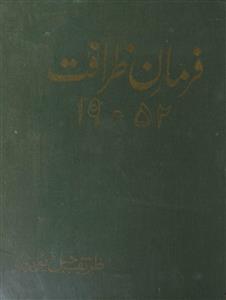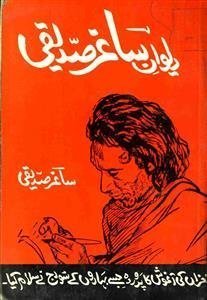 For any query/comment related to this ebook, please contact us at haidar.ali@rekhta.org
For any query/comment related to this ebook, please contact us at haidar.ali@rekhta.org
About The Author
A poet by taste and temperament, Hamid Raza Zarif Jabalpur was born in Katni, district of Jabalpur, on 26 November 1913. He was attracted to bortumorous poetry even in his childhood. To begin with, he was only an avid listener of humorous verse, but a strange accident of life awakened the poet in him. A severe attack of malaria in his school days impaired his hearing faculty. As if to compensate for this loss, nature awakened his faculty of speech, and sharpened his sense of humour. He developed his poetic skills under the guidance of Dr Shaida of Jabalpur. Apart from being a poet, Zarif was a responsible man of the world, with wife and children and a job in the Military Engineering Service. In one of his famous couplets, he is perhaps commenting on his domestic situation:
Ho wahdat ke kasrat, hain donon museebat, na wahdat hi achchi, na kasrat hi achchi,
Yeh beewi ki wahdat, yeh bachchon ki kasrat, museebat nahin hai tau phir aur kya hai.
Singleness, or multiplicity, both can jar and bore,
Single wife and plenteous brood, what else is this if not a load?
Zarif's poems became immediately popular at the mushairas at Jabalpur and Delhi and earned the praise of famous poets like Hafeez and Jigar.
The first phase of his poetry, to which belongs his collection of poems called Farmaan-e-Zarafat (1952), shows him as a poet of light-hearted humour, out to tickle and delight, rather than to work as a satirist of men and manners. The very first poem of the collection, Mechanic Poet, is an example of pure humour, with no serious didactic intention. But we cannot ignore poems like Laaloo Khet and Parwurdigara, where the poet uses his weapons of wit and humour to castigate the new establishment of Pakistan, which treats its migrant population with callous unconcern. In his second book, Talaafi-e-Maafaat, written when he migrated to Pakistan and settled in Karachi, there is a palpable satirical vein in poems like Fourteenth August and Kahan Gaye. However, even in this book, there are hilarious poems like Layalpur ke Machhar, (Mosquitoes of Layalpur), which demonstrate the poet's life-long commitment to humour and comedy.
 For any query/comment related to this ebook, please contact us at haidar.ali@rekhta.org
For any query/comment related to this ebook, please contact us at haidar.ali@rekhta.org











